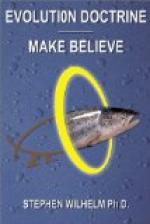Such a principle as the law of gravitation, like evolution, is true if the basic facts are true, if they are reasonably related, and if the conclusion is drawn reasonably from them. It is true for all persons who possess normal minds, and this is why Huxley speaks of science as “common sense,”—that is, something which is a reasonable and sensible part of the mental make-up of thinking persons that they can hold in common. The form and method of science are fully set forth by these definitions, and the purpose also is clearly revealed. For the results of investigation are not merely formulae which summarize experience as so much “conceptual shorthand,” as Karl Pearson puts it, but they must serve also to describe what will probably be the orderly workings of nature as future experience unfolds. Human endeavor based upon a knowledge of scientific principles must be far more reliable than where it is guided by mere intuition or unreasoned belief, which may or may not harmonize with the everyday world laws. Just as the law of gravitation based upon past experience provides the bridge builder and the architect with a statement of conditions to be met, so we shall find that the principles of evolution demonstrate the best means of meeting the circumstances of life.
Evolution has developed, like all sciences, as the method we have described has been employed. Alchemy became chemistry when the so-called facts of the medievalist were scrutinized and the false were discarded. Astrology was reorganized into astronomy when real facts about the planets and stars were separated from the belief that human lives were influenced by the heavenly bodies. Likewise the science of life has undergone far-reaching changes in coming down to its present form. All the principles of these sciences are complete only in so far as they sum up in the best way the whole range of facts that they describe. They cannot be final until all that can be known is known,—until the end of all knowledge and of time. It is because he feels so sure of what has been gained that the man of science seems to the unscientific to claim finality for his results. He himself is the first to point out that dogmatism is unjustified when its assertions are not so thoroughly grounded in reasonable fact as to render their contrary unthinkable. He seeks only for truth, realizing that new discoveries must oblige him to amend his statement of the laws of nature with every decade. But the great bulk of knowledge concerning life and living forms is so sure that science asserts, with a decision often mistaken for dogmatism, that evolution is a real natural process.
* * * * *




